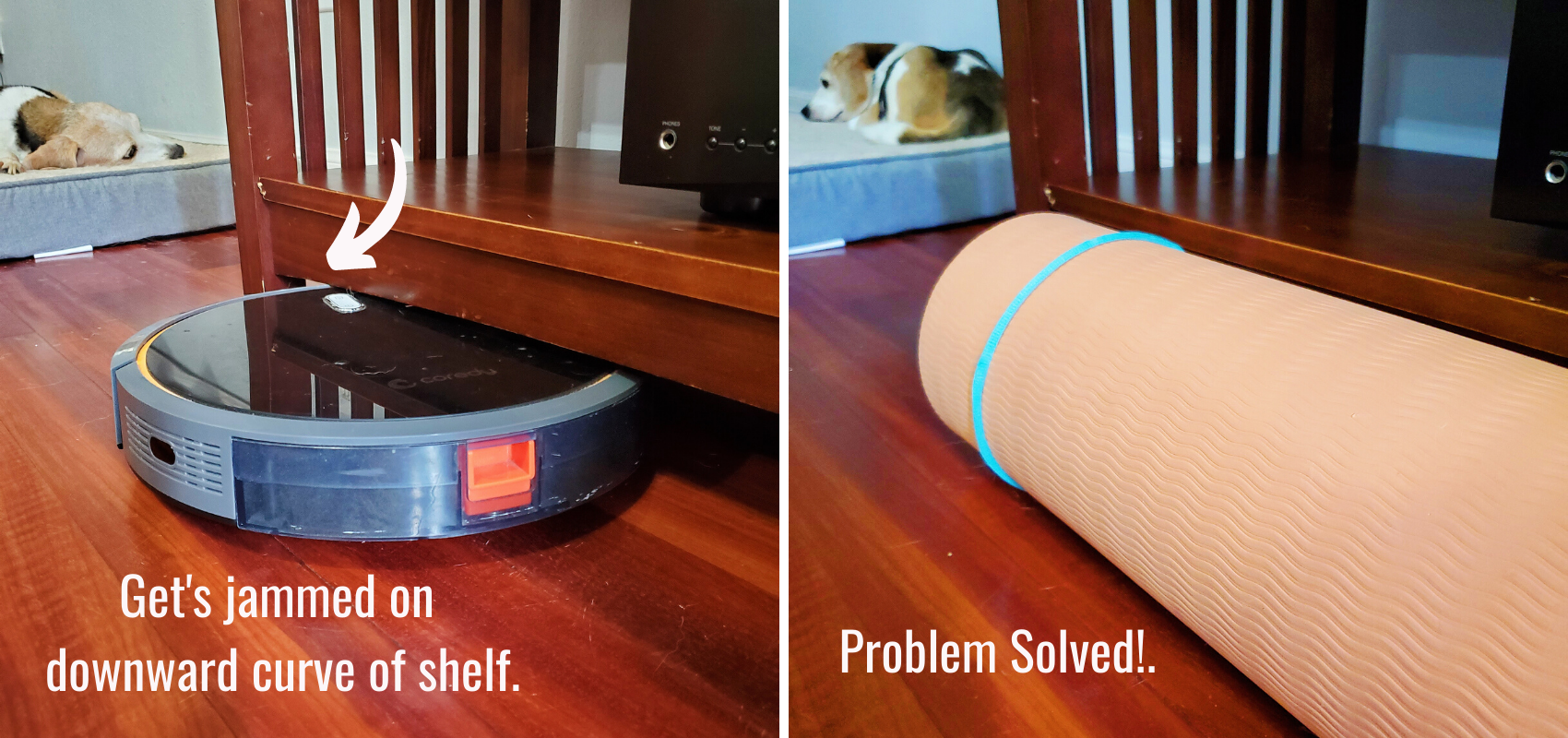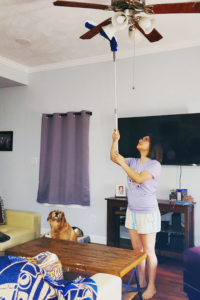I know, all too well, the struggle of household management with chronic pain, especially when it is debilitating pain. Throughout my journey with endometriosis, a chronic inflammatory condition, there have been many days where the severe pain has left me with no energy to complete my usual day to day tasks. This is especially frustrating when I see that the energy I am lacking affects my family, career, and passions. So, today I’m sharing 8 tips for effective household management that will not (hopefully) steal you of all your energy and send you into a flare of pain.
Summary: Tips for Household Management with Chronic Pain
1. Ask for Help!
2. Clean a Little Every Day
3. Invest in a Robot Vacuum
4. Trust Someone Else to Grocery Shop for You
5-7. Utilize tools that help you get things done
Stools. Stools! STOOLS!
Laundry Detergent Dispenser
Cleaning Tools with extensions
8. Go Minimal!
Disclosure: This post may contain affiliate links. I earn from qualifying purchases. This comes at no extra cost to you and I only recommend products that I believe will be valuable to my audience.

Tips for Household Management with Chronic Pain
Tip #1: Ask for Help!
I get it. You want to feel independent. You want to be able to get through a daily task and know that you accomplished something; not only for yourself, but for your family. But at the end of the day, is it worth it? Is it worth the pain? Or is it worth not having the energy to give your loved ones the time and attention they deserve?
Because, although cooking and cleaning for someone else is a love language, you are doing yourself and your loved ones a disservice if that is all that you can give them. And if you live alone, you are doing yourself a disservice and not allowing yourself to achieve the real goals that you have in life. Having to lay in bed from fatigue and pain after doing a bunch of chores is no way to live.
I learned this the hard way, as I used to be one of those people who would deep clean my home every week. I would spend almost an entire day cleaning everything from the cabinets to the base boards; all while laundry was running. As you can imagine, I found it hard to maintain this routine as I started to feel more pain and fatigue from Endometriosis.
After some time, it became clear that I needed to replace my old routine with a new one. I had to let go of my very particular level of cleanliness, so that I could actually live. Don’t get me wrong, I still have my limits for acceptable messiness and disorder, but I have learned to live with the occasional mess.
That is why my biggest recommendation here is to ask for help and accept the help! If you live with someone or have children, ask them to help you keep the house clean. Ask them to take the trash out when your mind tells you that “you can do it.” I don’t doubt that you can, but preserving your energy is key.
And when that help is received, it’s important that you let them help you in their own way, which is something I have a hard time with myself. Meaning, if they clean differently than you usually would, don’t let it bother you. Be thankful for the help and embrace it!
Tip #2: Clean A Little Every Day
To keep from having to deep clean often, focus the energy you do have on cleaning or picking up at least one room every day. I find it most beneficial to prioritize the rooms that get dirty the most (i.e. the kitchen and bathrooms), but this is where your family or partner can help!
By having them help with the dishes, you can focus your energy on cleaning the bathroom; or vice versa. And on days when the bathroom or kitchen need little to no attention, tackle a bedroom or the living room. Breaking up the cleaning tasks can help keep your home clean without having to use up all your energy on a full day of cleaning.
If you live alone and have the financial resources to do so, then I recommend you invest in a helper to clean your home when it requires some deep cleaning. There is no shame in that. Look for local Maid Services in your area or reach out to friends and family. You’ll be surprised how many people know somebody who can do it for a reasonable price.
There are tons of people always looking to make extra money for physical work. I did some house cleaning while I was in college and I was so thankful to have the opportunity to make extra money. You can do that for someone, while also benefiting yourself.
Tip #3: Invest in a Robot Vacuum
A clean floor can make all the difference, and this is especially true for pet owners. One of the best investments I ever made was a robot vacuum. It does all the work for you with very little effort– notice I didn’t say effortless.
Because the truth is, a robot can only do its best work when the floors are clear of clutter. Wires, tasseled rugs, and some furniture items can get in the way and cause the robot to shut down due to user error.
Not that I expect you to move furniture . . . remember you are trying to preserve energy, while still getting things done. But for items that sit at just the right height for your robot vacuum to get jammed, then you’ll want to be sure you block access to that area. I sometimes use a rolled-up yoga mat.
Other than the furniture, make sure to pick up any wires, cords, or tasseled items, so that these items don’t get tangled in your vacuum. You might be thinking: aren’t these robots supposed to know not to pick up wires or get caught under furniture? Well, in my experience with two different robot vacuums (iRobot and Coredy), these issues were consistent with both brands. So, let’s just say, you’ve been warned.

Tip #4: Trust Someone Else to Grocery Shop for You
Even before the COVID-19 Pandemic, I was using grocery delivery services for over one year. It’s by far one of the best inventions ever (in my opinion)! Granted, I recognize that it’s not financially feasible for everyone. Heck! There are times when I can’t afford it.
With service fees, delivery fees, and the expected tip to the driver, I can see why people avoid grocery derlivery. For me, the savings on gas and time are worth it. But even if you want to avoid the extra fees, there is still a way to get your shopping done without actually going shopping yourself.
 Friends and Family
Friends and Family
Y’all! Utilize your support system! Friends and family are usually very willing to help run easy errands for you. If you’re immediate support system is not available, then try posting on Facebook or the Nextdoor app, and ask if anyone is available to help you. To make it easy for them, order curbside pick-up, so all they must do is pick it up and deliver it to you. And if you want to avoid curbside order fees, look for stores that offer free curbside pick-up, like Wal-Mart.
Grocery Pick-up
On that same note, if you find yourself in a situation where you don’t have anyone offering or agreeing to help you, then set aside a time to go pick them up yourself. In the end, you’ll still be benefitting from the help of someone else shopping for you.
Utilize tools that help you get things done.
Tip #5: Stools. Stools! STOOLS!
Listen . . . you can still get stuff done while sitting! For daily kitchen tasks, like dishes or chopping veggies, a stool can be just the thing to help you get this done. Finding a stool that is adjustable in height is perfect for this. Not only does it allow you to adjust to counter height, but it can also be lowered to help you load those dishes in the dishwasher without too much bending.
Of course, this only really works for loading the top rack of most dishwashers, but like I said before, we are always trying to preserve energy!
Stools can also be used in laundry rooms. If you have a set up that allows you to fold laundry as you pull it out of the dryer, then make it happen. Set up your stool in front of the dryer, take a seat, and knock out this dreaded chore.
Tip #6: Laundry Detergent Dispenser
Detergent bottles can be very heavy and pain inducing. It may seem like an ordinary task, but with chronic pain, joint problems, or even post excision surgery, carrying a bottle that is bulky and over 10 lbs. can be difficult (or against doctor’s orders).
If you prefer the typical commercial/retail products, laundry pods can be your answer. They are lightweight and come in an easy to access container. But if you are trying to avoid endocrine disruptors, allergens, or toxic chemicals, a liquids plant-based product might be your go-to. However, to get the biggest bang for your buck, you often have to buy larger bottles, which can be difficult to carry.
Having a dispenser can help prevent the damage and pain that can be cause by lifting heavy detergent containers. Having a family member, friend, or neighbor pour the laundry into the dispenser can be helpful, which goes back to tip #1.
 Tip #7: Cleaning Tools with extensions
Tip #7: Cleaning Tools with extensions
Much of the difficulty that comes from cleaning your house is due to the physical toll it can take to constantly bend, reach, scrub, etc. But if you’re doing all of these things, then you’re not doing it right.
Tools that have extensions are your friends! Tools like a duster with extendable handle can help you reach high and low places without reaching or bending. This is helpful for dusting shelves, cleaning baseboards, and wiping vents, blinds, and fans.
Another helpful tool is an extendable tub and tile scrubber. Because, let’s be honest, the shower and tub are the most difficult to clean – if you’re not doing it right.
So, what’s the right way?
- First, start with a wet surface so that your cleaning product can really spread and clean easily.
- Second, use a cleaning spray of your choice and spray your shower/tub from top to bottom, focusing on areas that have more grime and soap scum.
- For me, this is the only place in my home where I actually use a more conventional product, like the Scrubbing Bubbles Mega Shower Foamer. I know it’s not ideal, especially when changing all my products to more non-toxic and sustainable ones. But in this case, I go for what is easiest for my particular situation.
- Third, after letting the cleaning product is for about 5 minutes, use your extendable tub and tile scrubber to scrub the walls and floor of the shower/tub. If you need more abrasion, you can use baking soda after rinsing the cleaning mixture to help get any hard deposits.
- Lastly, use the shower head to rinse everything off. If you have a detachable shower hose, then you’re set. If not, you can get all areas that the shower head doesn’t reach by using a cup of water to rinse the product off.
Tip #8: Go Minimal!
Ever feel overwhelmed by all the stuff that needs to be cleaned? Anytime is a perfect time to re-evaluate how much stuff you have and tend to accumulate.
If you haven’t already heard of minimalism, I’m happy I could finally enlighten you. But if you have heard of minimalism and thought, “There is no way I can do that!” Well, think again!
Because the truth is, there are varying degrees of minimalism, but the whole idea is that you only purchase and keep things that are truly useful to you. Minimalism doesn’t have to mean that you get rid of everything (although it can if you want it to). Basically, it can mean whatever you want it to mean. . . just be sure that your overarching goal is to decrease the amount of stuff you have.
But just in case you need some ideas. . .
Evaluate your décor style.
Stay away from excess furniture and knick-knacks. They aren’t important. All you need is furniture to comfortably seat your family and store your items.
Go digital.
Instead of constantly accumulating more papers (especially that healthcare paperwork), try scanning it onto a flash drive or external hard drive. Of course, this option requires you have a scanner or printer with scanning capabilities.
Look at your kitchen.
Go through you kitchen and get rid of the extra dishes, cooking utensils, and drink ware that is not used or has not been used in 12 months. Those are just extra dishes you will have to clean.
Evaluate your wardrobe.
Are you only wearing 25% of the items that you own? Then maybe it’s time to donate the other 75%.
Bonus: Watch the Marie Kondo Series on Netflix for inspiration 🙂
In the end, going minimal will give you less to organize and clean. And honestly, getting rid of the overwhelm will help decrease your stress (a proven factor in increasing symptoms).
Final Notes on Household Management with Chronic Pain
If you didn’t get the point already, the theme here is to minimize how household chores affect your energy. You want to help prevent flares in symptoms, stress and pain because that is key to saving your already minimal energy. This will ultimately make sure you have the energy you need for the things and people that are important to you.
So, tell me . . . what do you do to maintain your household with chronic pain?






